
When was the last time you read an unforgettable new novel? Or saw a phenomenal film? Have you even been to a movie theater this year? American culture is in crisis, wrote Kat Rosenfield in an essay that serves as her manifesto, now that she’s our new culture critic. Identitarian politics has sucked the life out of storytelling, everywhere from Hollywood to young adult fiction. And yet, “despite the strange takeover of culture by tasteless scolds,” she wrote, “I still believe there’s nothing better than a story that grabs you and won’t let go.”
She wanted you all to recommend a few. “What are you thinking? What are you watching? Tell me; I’m dying to know,” she wrote. The response was incredible. For the next week, our inboxes filled up with recommendations, which gave us hope that culture is not, after all, completely dead. Below, Kat replies to a few letters that helped her identify the great hope for American television.
Black Bird, a true crime miniseries on Apple TV+, checks all the boxes Kat requires. It’s fun, smart, sexy, propulsive, and of the moment, and it gets extra points because the protagonist is a reporter. —M. Pawlosky
Kat says: I loved Black Bird, which in addition to being sexy and propulsive is an absolute smorgasbord of phenomenal performances: there’s Taron Egerton, who continues to demonstrate incredible range as a leading man—and is also, it must be said, not a chore to look at. There’s an astonishing—and award-winning—performance by Paul Walter Hauser, a rare actor who isn’t afraid to make himself absolutely repulsive. Ray Liotta plays an aging dad with surprising vulnerability; Sepideh Moafi projects a perfect blend of cynicism and wit in her role as an FBI agent.
Also noteworthy about Black Bird: it was developed for TV by crime novelist Dennis Lehane, whose storytelling instincts are second to none. If you see his name attached to a project, it’s a good bet that it’ll be watchable.
I grew up loving movies and went to film school, but one of the main reasons I was put off pursuing a career in film was, frankly, concerns about the exacerbating taste of moviegoers. I’ve noticed it especially as the Marvel Cinematic Universe became the box office center of gravity. It feels like it’s getting harder and harder for great art films to resonate and find their audiences. Could you imagine Little Miss Sunshine or Adaptation, for example, getting made in 2024 and having as much success as they did 20 years ago? Anyone born after 2005, it seems, has no interest in engaging with the film as an art medium.
But in response to the question about what we’re watching these days, I’d like to plug Apple TV+, currently churning out several really good, brain-teasing, mysterious sci-fi shows, like Severance. —Ian Zigel
Kat says: Actually, I can totally picture a world in which something like Adaptation finds an audience today—or even in which Adaptation itself is rediscovered by the Zoomers. For those who haven’t seen it: it’s a 2002 comedy directed by Spike Jonze, in which Nicolas Cage plays the film’s actual screenwriter, as he struggles to write a screenplay for something else. Its themes of identity, creativity, and self-parody, and its protagonist’s desperation to narrativize a better, cooler version of himself into existence. . . wouldn’t this be catnip to a generation raised on TikTok?
But speaking of Spike Jonze: Severance, an Apple TV+ series that reminds me of Being John Malkovich mashed up with Memento, is indeed worth watching. A word of warning, though, to others: this show is not made to be half-watched while you’re doomscrolling with one hand. Put your phone in another room, and let the high-concept weirdness wash over you.
The latest thing I’m watching is Presumed Innocent on Apple TV+. They seem to be the only one of our tech overlords that know how to make something worth watching. We are devolving into a trash culture and a trash society and I’m so tired of watching it happen. It’s almost embarrassing to be an American these days. —GGSD
Kat says: Noticing a trend here: Apple+ is clearly the new dark horse candidate for great original content on the small screen. This tracks with my own viewing experience: in addition to the series recommended above, my household has also enjoyed For All Mankind, Slow Horses, Servant, and Ted Lasso (well, the first season, anyway.) Presumed Innocent is next on my watchlist, although I read the Scott Turow novel it’s based on when I was a teenager, so alas, I won’t be surprised by the twist.
But I can’t agree with your assessment of American culture, which has always been big and beautiful and wild and unwieldy—and which has a way of exploding in all directions at the precise moment when a bunch of moralizing scolds in charge of our institutions start trying to dictate what shape it should take. In the 1940s, filmmakers responded to the sniffy constraints of the Hays Code—a set of moralistic rules applied to motion pictures—by cramming their movies with winking sexual innuendo; in the 1990s, they met the twin pieties of the Moral Majority and political correctness with an era of raunch comedy, reality dating shows, and MTV’s Jackass.
The most exciting moments in American art have always been preceded by some lemon-faced culture cop whining, “You can’t say that”—and I, for one, can’t wait to see where we go next.
After Donald Trump was shot, former Marine Elliot Ackerman wrote that the ex-president had responded like a combat leader: “A bullet came an inch from blowing his brains out. He took cover. And when he stood, with blood splattered across the side of his face, he had the presence of mind to pump his fist in the air and shout, ‘Fight!’ and ‘USA!’ to his supporters, just when they were looking to him for leadership.”
“The assassination attempt,” he added, “has also given Trump a new moral authority.”
In response, another former Marine wrote to us to say: “I don’t want a combat leader as president.”
I had the opportunity to witness battlefield courage as a Marine in Iraq. I found it an inspiring and calming force. But Donald Trump is not a combat leader, and waving a fist to a scared crowd is not the same thing as a Marine leader demonstrating coolness while leading his platoon in combat. Exuding bravery under fire, while laudable, is a fickle measure of moral courage or statesmanship.
In a political context, it is great for a dramatic photo, but ultimately blinds us to larger failures. To frame it in combat terms, years of vitriol from Donald Trump and his party—promoting violence against the media, political opponents, and citizens—has pushed our political discord into dangerous terrain.
The photo of a bloodied Trump, and the adulation it was met with, reminded me of our national tendency to assume displays of tough-guy strength somehow equate to smart leadership or a superior moral position. Unfortunately, history has a habit of proving this wrong time and again. George W. Bush’s aircraft carrier landing to call Operation Iraqi Freedom a success comes to mind. Those little PR moments are the fast food of politics—cheap and empty of any political nutrients. Unfortunately, campaigns can be won or lost on them, as the Democrats are now in danger of learning.
What happened in Pennsylvania was terrible. Trump did not deserve to be shot at. Corey Comperatore, who was a former firefighter, did not deserve to die. But these things happened, and I’m unwilling to look at Trump as some kind of moral authority because of them.
In the same way I don’t believe a general is inherently qualified to be president by virtue of his military stature, a presidential candidate doesn’t advance the ranks of credibility through physical courage. Trump is not running to become a rifle platoon commander. I don’t need my presidents to be physically brave. I need them to be competent. I need them to be forthright and compassionate. I need them to understand that their behavior is a huge influence on culture. I need them to know when the people are exhausted and easily led by vitriol. I need them to have the courage to not exploit it.
That is leadership. We seem to be lacking it. —Jerad W. Alexander
On Saturday, The Free Press published a gorgeous piece by intern Elias Wachtel, an account of his 2,000-mile hike along the Appalachian Trail. The comments were a joy to read—you told us his inspiring story was exactly what you needed, in the middle of a depressing political moment. We also received a lot of lovely letters about Free Pressers’ experiences of going into the wild. Here are just a few of our favorites.
I first started backpacking when I was 15 years old. I did two weeks straight in the Pasayten Wilderness Area with Outward Bound. This wasn’t a random choice. My dad, who committed suicide when I was six years old, went on Outward Bound at the same age in the same place. I wanted to do what he did. If Outward Bound is still in Mazama, Washington, when my boys are old enough, I’d love them to do it as well.
It was a very formative experience for me. Carrying 65 pounds on my back through mountain passes with a group of strangers I didn’t like very much gave me grit. It was hilarious seeing the city kids from San Francisco and Seattle freak out when we ran into a black bear. I mean, the bear took one look at us and ran off. Big deal. Predators are part of the wild.
Going into the wilderness is very important to me. Doing physically demanding things in general is important to me too. Hard things put life into perspective; it’s its own therapy. When you are hiking over a mountain pass so steep you are essentially using your hands to climb it, it makes the BS of daily life seem easy. I’m glad I learned that at 15.
—David Bradshaw
Elias’s accomplishment reminds me of a cross-continental road trip that, at age eighteen, I made via Greyhound from my native New York City to San Francisco, California. I had recently graduated high school, was about to enroll as a freshman at the University of California, and I wanted to get a head start on becoming a California resident. Flying would have been too easy, and hitchhiking would have been too reckless; therefore, transportation evoking Simon & Garfunkel’s song “America” was the workable solution. In 1988, it cost $68—plus cash for meals.
Usually I don’t savor isolation in nature, but witnessing successive regional American landscapes can be thrilling, and occasionally breathtaking. Along Interstate 80, Ohio, Indiana, Illinois, and Iowa are flat; Nebraska and Nevada are long; and Wyoming is rocky. This, and talking with fellow bus travelers, gave me a completely new perspective.
We need more curious adventurers such as Elias.
—Jeremiah Duboff
I’ve always been obsessed with dogs. I got my first, a Jack Russell terrier, when I was 10 years old, and at some point I made a promise to Brittany: I would take her from sea to shining sea. As a child, we’d traveled a lot, and I succeeded in bringing Brittany along a good 75 percent of the time. Despite her barking and fighting, she was a great travel companion.
After I got Brittany, I promptly started begging for another dog. I got Bello, the adopted husky mix, when I was 16 years old. At 21, I got Bravo, another Jack Russell terrier who had been dumped at a friend’s house in the country.
As college finished, I sold my little Kia Rio, bought a used 4Runner with 190,000 miles on it, and slapped the cheapest rooftop tent I could find on top. I packed the back of my SUV so full of stuff that when Bello stood, his back touched the roof.
We were starting from our home in Memphis, Tennessee, and would be heading north to Alaska, before heading south to California and finally working our way back east to home. My estimated time frame was two months. When people found out about my road trip, they were always shocked I was bringing three dogs.
“Who do you propose I leave at home?” I’d ask. Brittany was 13 years old now, but she was why I was doing the trip. She had to come. Bello? I was a 23-year-old woman going on a trip alone, and he was my biggest dog; of course he had to go. Bravo? Well, he was the youngest of the bunch; he’d have the most fun of all three. There was no option. All had to go.
If you want an adventure, it will be hard. Stop wishing it was easier and just enjoy the scenery and the struggle. It’s what life is about. —Erica Abernathy
Do you have a unique perspective on a Free Press story? Can you bring your personal experience or expertise to bear on an issue we cover? We want to hear from you. Send us a letter to the editor: letters@thefp.com.
To support our work, become a Free Press subscriber today:

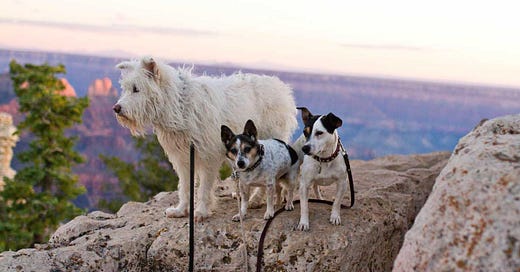







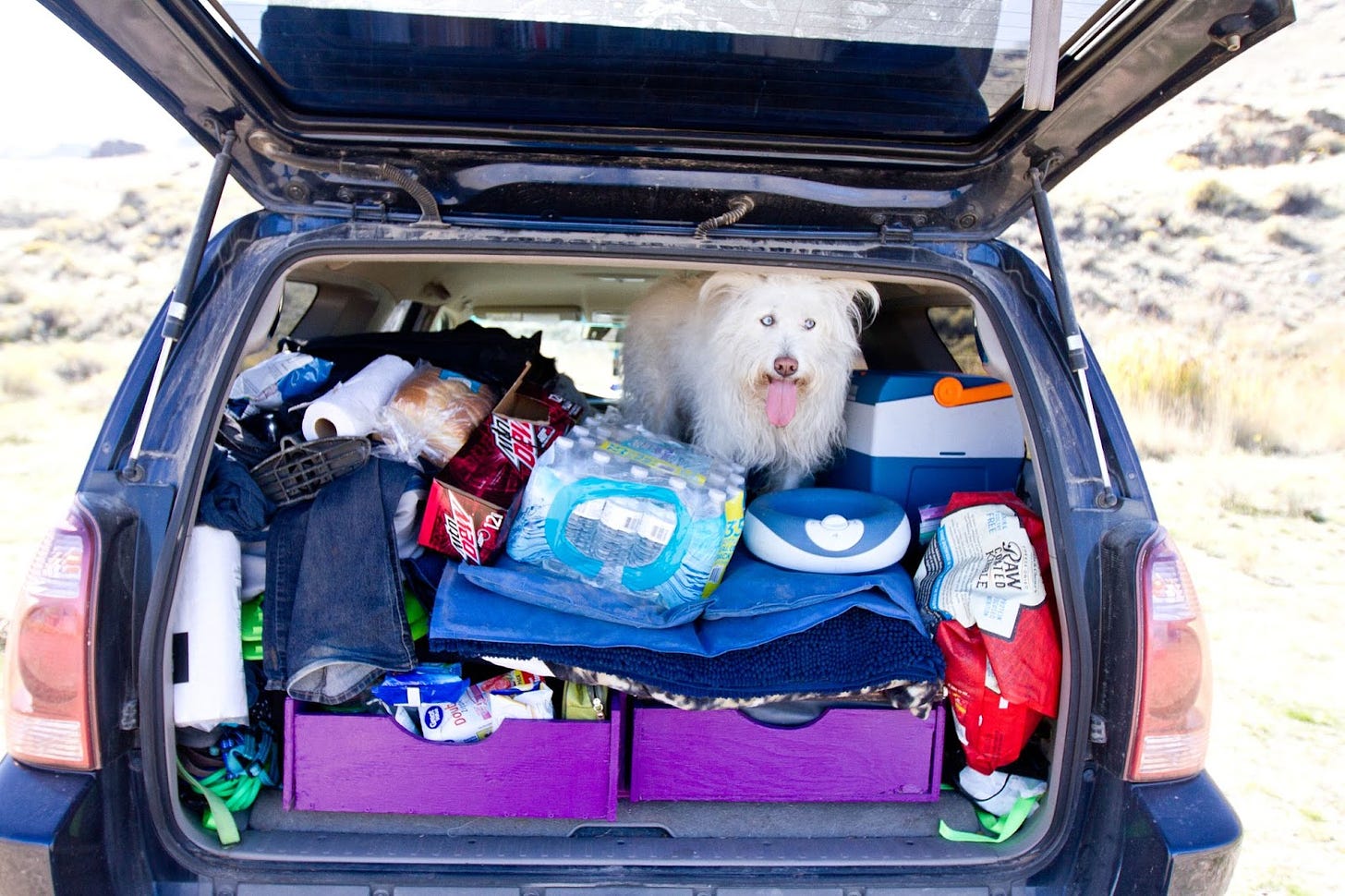
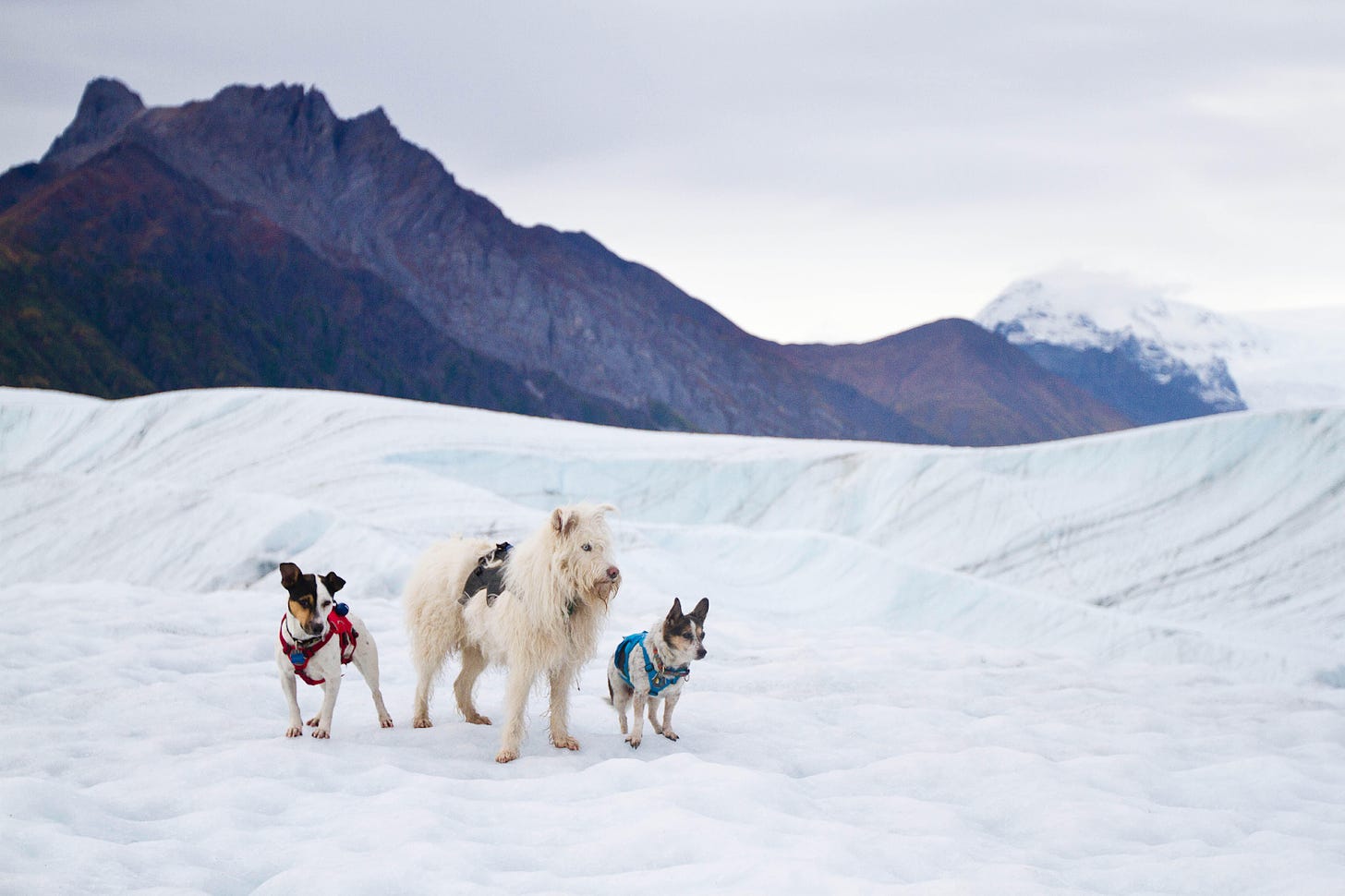
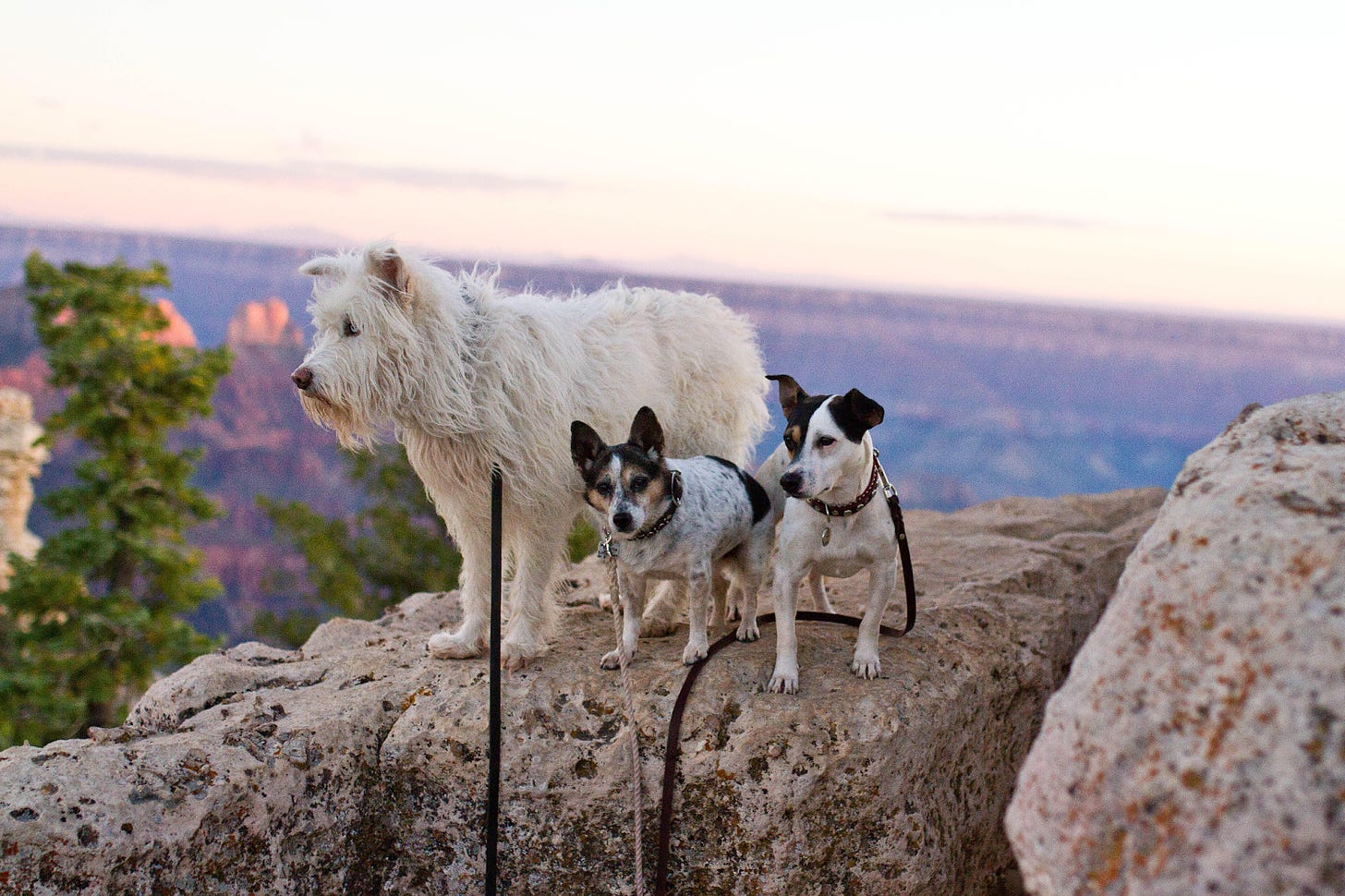
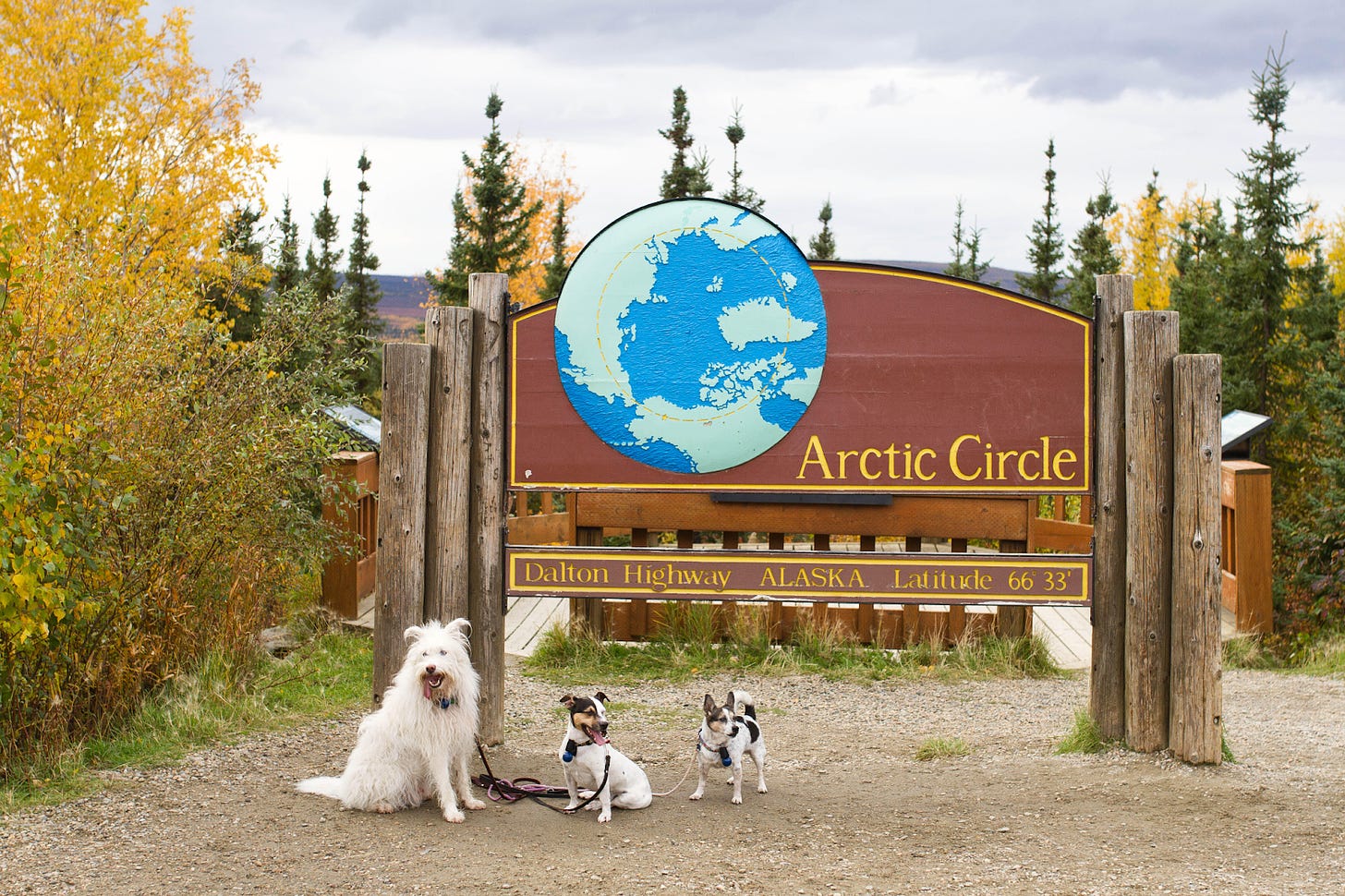

Nobody thinks Trump is fit to be a rifle platoon commander. They do think, however, that when you line him up next to Joe Biden, Kamala Harris, and Hillary Clinton, he looks like Captain America in comparison.
"... years of vitriol from Donald Trump and his party—promoting violence against the media, political opponents, and citizens... "
Years of vitriol from WHOM, Jered Alexander? Are you fucking serious? Trump, who has been called, amongst other things, a:
- fascist
- Literally Hitler
- An existential threat to Democracy
- A Russian spy
- A rapist
The silly nicknames and schoolyard taunts of Trump and the very real criticisms of the media and Democrats do not even come CLOSE to the insane lies that have been told and continue to be told about Trump by people like YOU, Jered, the Democrats and their media allies.
Another TFP writer who is nothing but a Leftist Propagandist. Yeah... something needs to change here at TFP. This is not what I want to pay for... NYT-lite with all the same lies and propaganda of the NYT, just without the antisemitism.